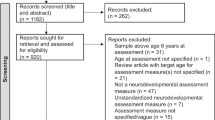Abstract
Early identification of children with developmental delay is a longstanding goal in pediatric research and practice, and a large number of screening and assessment tools have been developed to this end. Unfortunately, these measures are problematic: Definitions of “delay” are not consistent, thresholds are somewhat arbitrary, some scoring systems are affected by systematic error, and the natural variability in the timing of development may limit the accuracy they can achieve. Significantly, the ability of early screening to predict longer-term functional problems has proven to be very limited. False positive results are also not harmless, and the effectiveness of early interventions is in some doubt. The benefits of early screening using existing instruments and interventions are therefore doubtful. Some improvements may be possible, however, by making use of more information sources, by using variable thresholds, and by making more rigorous use of cost-benefit analysis.
Similar content being viewed by others
Abbreviations
- ASQ:
-
Ages and Stages Questionnaires
- PEDS:
-
Parents’ Evaluation of Developmental Status measure
- BSID:
-
Bayley Scales of Infant and Toddler Development
References
Papers of Particular Interest, Published recently, Have Been Highlighted as: • Of importance
American Academy of Pediatrics, Committee on Children With Disabilities. Developmental surveillance and screening of infants and young children. Pediatrics. 2001;108:192–6.
American Academy of Pediatrics. Bright futures: guidelines for health supervision of infants, children, and adolescents (3rd ed.). Elk Grove Village: Author; 2008.
US Preventive Services Task Force. Screening for speech and language delay in preschool children: recommendation statement. Pediatrics. 2006;117(2):497–501. doi:10.1542/peds.2005-2766.
Scottish Intercollegiate Guidelines Network. Assessment, diagnosis and clinical interventions for children and young people with autism spectrum disorders: a national clinical guideline. Edinburgh: SIGN; 2007.
Canadian Task Force on Preventive Health Care (2016). Recommendations on screening for developmental delay. Canadian Medical Association Journal (published online Mar 29, 2016). In this recent evaluation of the evidence for developmental screening, the Canadian Task Force on Preventive Health Care concludes that there is insufficient evidence that screening programs improve outcomes among children with developmental delay.
Williams R, Clinton J, Canadian Paediatric Society Early Years Task Force. Getting it right at 18 months: in support of an enhanced well-baby visit. Paediatr Child Health. 2011;16(10):647.
Nipissing District Developmental Screen. Available at: http://www.ndds.ca. Accessed 17 Nov 2014.
Smith RA, Manassaram-Baptiste D, Rooks D, Doroshenk M, Fedewa S, Saslow D, Brawley OW, Wender R. Cancer screening in the United States, 2015: a review of current American Cancer Society guidelines and current issues in cancer screening. CA Cancer J Clin. 2015;65(1):30–54.
Pace LE, Keating NL. A systematic assessment of benefits and risks to guide breast cancer screening decisions. JAMA. 2014;311(13):1327–35.
King TM, Tandon SD, Macias MM, et al. Implementing developmental screening and referrals: lessons learned from a national project. Pediatrics. 2010;125(2):350–60. doi:10.1542/peds.2009-0388.
Squires J, Bricker D, Potter L. Revision of a parent-completed development screening tool: ages and stages questionnaires. J Pediatr Psychol. 1997;22:313–28.
Brothers KB, Glascoe FP, Robertshaw NS. PEDS: developmental milestones—an accurate brief tool for surveillance and screening. Clin Pediatr. 2008;47(3):271–9.
Bayley N. Bayley Scales of Infant Development. 3rd ed. PsychCorp, Harcourt Assessment Inc: San Antonio, Tex; 2006.
Newborg J. Battelle Developmental Inventory. 2nd ed. Chicago: Riverside; 2005.
Frankenburg WK, Dodds J, Archer P, Shapiro H, Bresnick B. The DENVER II: a major revision and restandardization of the Denver Developmental Screening Test. Pediatrics. 1992;89:91–7.
Committee on Children With Disabilities. Developmental surveillance and screening of infants and young children. Pediatrics. 2001;108(1):192–6.
Kazdin AE. Evidence-based assessment for children and adolescents: issues in measurement development and clinical application. J Clin Child Adolesc Psychol. 2005;34(3):548–58.
Wilson JMG, Jungner G. Principles and practice of screening for disease. Geneva: World Health Organization; 1968.
Willis BH. Spectrum bias—why clinicians need to be cautious when applying diagnostic test studies. Fam Pract. 2008;25:390–6.
Lindstrom K, Bremberg S. The contribution of developmental surveillance to early detection of cerebral palsy. Acta Pediatr. 1997;86:736–9.
Henderson S, Sugden D, Barnett A. The movement assessment battery for children-2. 2nd ed. London: Pearson Assessment; 2007.
Boyd R. What a difference a day makes: age-related discontinuities and the Battelle Developmental Inventory. J Early Interv. 1989;13:114. doi:10.1177/105381518901300202.
Veldhuizen S, Rodriguez C, Wade TJ, et al. Misclassification due to age grouping in measures of child development. Arch Dis Child. 2015;100(3):220–4.
Hack M, Taylor HG, Drotar D, et al. Poor predictive validity of the Bayley Scales of Infant Development for cognitive function of extremely low birth weight children at school age. Pediatrics. 2005;116(2):333–41.
Johnson S, Marlow N. Developmental screen or developmental testing? Early Hum Dev. 2006;82:172–83.
Murray GK, Jones PB, Kuh D, et al. Infant developmental milestones and subsequent cognitive function. Ann Neurol. 2007;62:128–36.
Smetana GW. Rethinking "abnormal" blood pressure: what is the value? J Gen Intern Med. 2011;26(7):678–80.
Moons KGM, Royston P, Vergouwe Y, et al. Prognosis and prognostic research: what, why, and how? BMJ. 2009;338. doi:10.1136/bmj.b375.
Bellman M, Byrne O, Sege R. Developmental assessment of children. BMJ. 2013;346:e8687.
Council on Children With Disabilities, Section on Developmental Behavioral Pediatrics, Bright Futures Steering Committee and Medical Home Initiatives for Children with Special Needs Project Advisory Committee. Identifying infants and young children with developmental disorders in the medical home: an algorithm for developmental surveillance and screening. Pediatrics. 2006;118(1):405–20.
U.S. Department of Health and Human Services, Administration for Children and Families (2010). Head Start Impact Study: Final Report. Washington, DC.
Author information
Authors and Affiliations
Corresponding author
Ethics declarations
Conflict of Interest
Scott Veldhuizen declares that he has no conflict of interest.
Human and Animal Rights and Informed Consent
This article does not contain any studies with human or animal subjects performed by any of the authors.
Additional information
This article is part of the Topical Collection on Screening
Rights and permissions
About this article
Cite this article
Veldhuizen, S. Systematic Screening for Developmental Delay in Early Childhood: Problems and Possible Solutions. Curr Dev Disord Rep 3, 184–189 (2016). https://doi.org/10.1007/s40474-016-0090-x
Published:
Issue Date:
DOI: https://doi.org/10.1007/s40474-016-0090-x




